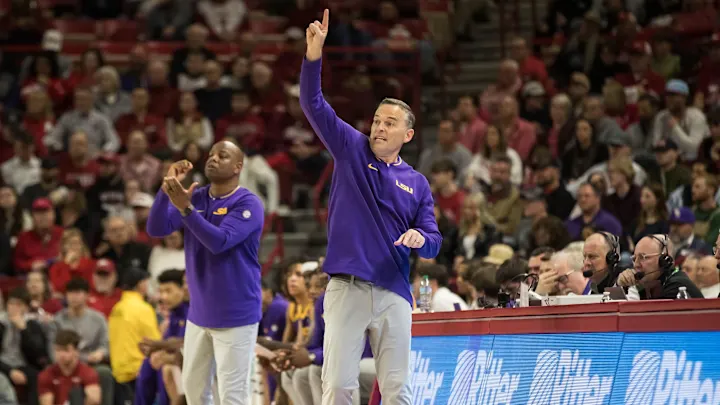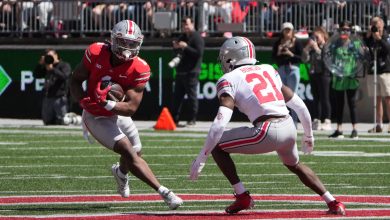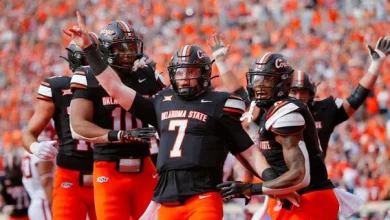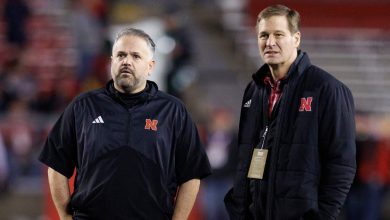LSU launches bold NIL strategy to enhance athletic success, attracting top talent, supporting athletes’ personal brands, and boosting recruitment.

In the ever-evolving landscape of college athletics, one of the most transformative changes in recent years has been the implementation of Name, Image, and Likeness (NIL) rights. For years, college athletes were prohibited from profiting off their own name, image, or likeness, but that all changed in 2021 when the NCAA opened the door for athletes to sign endorsement deals, engage in sponsorships, and receive compensation for their personal brand.
As the NIL landscape continues to develop, LSU (Louisiana State University) is diving headfirst into a bold new strategy to leverage this change and ensure its athletic programs remain at the forefront of collegiate competition. The Tigers, known for their dominance in sports like football, basketball, and gymnastics, are not just looking to keep pace with the competition—they aim to outpace it. LSU’s new NIL strategy is set to revolutionize the way they recruit, retain, and support their athletes, with a clear focus on maximizing the value of the brand of LSU athletics.
This ambitious approach to NIL rights has become one of the most talked-about topics in collegiate sports, as LSU aims to strike a balance between maintaining the traditional values of collegiate athletics while embracing the financial opportunities that come with the NIL era. From football to basketball to track and field, LSU is setting the stage for a future where athletes are given the resources, tools, and opportunities they need to thrive both on the field and in the business world.
The Catalyst for Change: NIL’s Arrival
The advent of NIL rights in 2021 marked a major turning point in college sports, shaking up decades of tradition and opening the door to new financial possibilities for athletes. In the past, college athletes were prohibited from engaging in endorsement deals, working with companies, or profiting from their own brand. The idea behind this was to preserve the “amateurism” of college sports, but the reality was that athletes were generating billions in revenue for universities, athletic departments, and sponsors, while seeing none of the financial benefits.
The 2021 decision by the NCAA to allow athletes to profit from their NIL marked the dawn of a new era. While this change was seen as long overdue by many, it created a new dynamic that universities and athletic programs had to navigate. As universities scrambled to get a handle on the new landscape, it quickly became clear that the schools with the best NIL strategies would have an edge in recruiting, team-building, and overall program success.
For LSU, this presented a unique opportunity. The university has a storied athletic history, with national championships in football, baseball, and gymnastics, and a large, passionate fan base that is deeply invested in the success of its programs. By capitalizing on the growing trend of NIL, LSU saw an opportunity to not only enhance its athletic programs but also provide its athletes with opportunities that could help set them up for financial success long after they graduated.
LSU’s Vision for NIL Success
LSU’s NIL strategy goes beyond just offering athletes the ability to sign endorsement deals. The university has rolled out a multifaceted approach that aims to provide resources and support to help athletes build their brands, engage with local businesses, and generate revenue in ways that align with their individual goals. The overall objective is to create a robust NIL ecosystem that will attract top talent, retain current athletes, and ultimately strengthen LSU’s athletic programs.
At the heart of LSU’s strategy is the creation of NIL-focused initiatives, partnerships, and collaborations designed to provide athletes with the tools they need to capitalize on their personal brands. The school has partnered with leading NIL companies to offer guidance and mentorship in areas like content creation, social media strategy, brand building, and marketing. The goal is not just to help athletes secure short-term endorsement deals, but to foster long-term relationships that can help them grow as entrepreneurs and individuals.
LSU’s athletic director, Scott Woodward, has been a vocal advocate for NIL, emphasizing that the university’s approach will be athlete-centered. “This is about empowering our student-athletes,” Woodward said in a statement. “We want to help them build their brands, take control of their futures, and create opportunities for themselves that will set them up for success in the years to come. NIL is not just a one-time deal—it’s an ongoing opportunity for growth.”
The university’s new strategy also includes the development of educational programs designed to help athletes navigate the complex world of NIL. LSU has teamed up with financial experts, branding professionals, and legal advisors to offer workshops and seminars on topics like contract negotiation, financial planning, and intellectual property rights. These initiatives aim to equip athletes with the knowledge they need to make informed decisions about their NIL opportunities.
LSU’s NIL Partnerships and Collaborations
One of the key components of LSU’s NIL strategy is its extensive network of partnerships with companies, influencers, and local businesses. The university has sought out partnerships with high-profile brands, such as Nike, Adidas, and Gatorade, as well as local businesses in Baton Rouge, to provide athletes with a wide range of opportunities.
These partnerships are designed to benefit both the athletes and the businesses involved. For athletes, the goal is to create a pipeline of opportunities that will help them grow their personal brands while generating income. For businesses, the goal is to tap into the massive fan base that follows LSU athletics, creating a mutually beneficial relationship that drives sales and exposure.
In addition to national brands, LSU has made a concerted effort to engage with local businesses in Baton Rouge. The school’s strong ties to the local community allow athletes to capitalize on their NIL rights without having to navigate the complexities of larger, more competitive markets. Local restaurants, retailers, and service providers have embraced the NIL movement, offering deals and partnerships to athletes that are specific to the Baton Rouge area. This creates a win-win scenario where athletes can grow their personal brands while simultaneously boosting local businesses.
One of the standout examples of LSU’s NIL partnerships is the creation of “Tiger NIL,” an initiative that connects LSU athletes with local and regional businesses to create customized endorsement deals. Through Tiger NIL, athletes can work with businesses to promote products and services, share their personal stories, and build relationships that will help them grow their personal brands. This initiative represents LSU’s commitment to ensuring that athletes are well-positioned to maximize their NIL opportunities while also contributing to the success of the local economy.
The Recruiting Edge: Attracting Top Talent with NIL
For LSU, one of the primary goals of its NIL strategy is to enhance the recruiting process. In a world where top-tier athletes are increasingly considering NIL opportunities as a deciding factor in where they attend school, LSU is using its NIL initiative as a major selling point for potential recruits.
By offering athletes the chance to develop their brands from day one, LSU is positioning itself as a forward-thinking, athlete-first institution that understands the financial realities of modern college sports. The school’s strong NIL infrastructure, combined with its history of success across various athletic programs, makes it an appealing destination for elite prospects who want to thrive both on the field and in the business world.
Recruiting is no longer just about the size of a program or the success of its coaching staff. It’s also about the financial opportunities available to athletes. LSU has recognized this shift and is using its NIL strategy as a way to differentiate itself from other programs that may be slow to adopt NIL-centric policies. By offering athletes a comprehensive and supportive environment for NIL, LSU aims to attract the best and brightest talent from across the nation.
Retaining Talent and Building Long-Term Success
While recruiting is important, LSU’s NIL strategy also focuses on retaining its current athletes and ensuring their long-term success. By providing athletes with the tools, resources, and mentorship they need to build their brands, LSU is ensuring that its athletes are set up for success both during their college careers and beyond.
In an era where transfer portal activity is at an all-time high, NIL has become an essential tool for retention. Athletes who feel that they have strong NIL opportunities at their current school are more likely to stay put, reducing the temptation to transfer to programs that may offer more immediate financial benefits. LSU’s investment in NIL is a direct response to this trend, as the school looks to build long-term relationships with its athletes and create an environment where they feel valued and supported.
The Road Ahead: LSU’s Future in the NIL Era
As LSU continues to implement its bold new NIL strategy, the university is setting the stage for a new era of success in college athletics. By embracing NIL rights, LSU is empowering its athletes to take control of their financial futures while simultaneously bolstering its athletic programs. With strong partnerships, educational initiatives, and a commitment to supporting athletes both on and off the field, LSU is poised to be a leader in the NIL era.
In the coming years, LSU’s approach to NIL will continue to evolve, adapting to new challenges and opportunities as the NIL landscape matures. But for now, the university is all in on its ambitious plan to harness the power of NIL and ensure that its athletes are given the tools they need to succeed. LSU has always been a powerhouse in college athletics, and with its innovative approach to NIL, the Tigers are poised to remain a dominant force for years to come.









